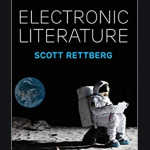electropoetics
Introduction: Electronic Literature as a Framework for the Digital Humanities

Rettberg and Saum introduce a collection of essays, presented at the Summer 2019 [Frame]works conference at the University of California, Berkeley, that bring literary criticism and creativity (equally) to bear on the digital humanities.
Gardening E-literature (or, how to effectively plant the seeds for future investigations on electronic literature)

In the course of her wide ranging review of Scott Rettberg's Electronic Literature, Anna Nacher offers a glimpse into "semi-peripheral avant-gardes" that are more open than other fields of digital culture to decolonization and not restricted to the Anglophone world.
Appealing to Your Better Judgement: A Call for Database Criticism

On the database itself as a cultural and textual artifact, a site where reading and interpretation combine with quantitative methods.
Something there badly not wrong: the life and death of literary form in databases

Returning to his 2010 essay, “Electronic Literature as World Literature,” Tabbi extends those arguments in light of community built scholarly databases that have since emerged and in contrast to an uncritical tracking of “views, citations, downloads and occasional shared themes” (not to mention an increased precarity of authorship, where one’s scholarly work is basically given away).
For digital practices to be literary, Tabbi argues, our selections need to circulate within various institutional, academic, curatorial, and cultural structures – each of which is devising its own set of relations to the digital. This essay aims to initiate those ongoing conversations and evaluations in the field of born digital, electronic literature. In so doing, Tabbi suggests how acts of close reading can bring scholars into closer contact with one another and also activate the databases where e-lit archives are presently stored, read, curated, and mined for verbal and perspectival patterns. (Which have been described, in broad outline as a kind of distant reading.)
“Decolonize” E-Literature? On Weeding the E-lit Garden

Berens asks: Should the e-literature community include third-generation works in collections, syllabi, databases, prizes? A related question: do third-gen makers have a role in “decolonizing” e-literature? Who or what “colonizes” e-lit? E-literature, like earlier avant gardes, began as a coterie and has become a scholarly field. Using the comparison of a field versus a walled garden, the essay examines critiques of e-literature and variations on field definitions. It ends with two ideas about how to "decolonize" e-literature; about how equity and inclusion work in tandem with decolonization, but are not the same thing; and why decolonization efforts are urgent in the context of pandemic and protests supporting Black lives and racial justice.